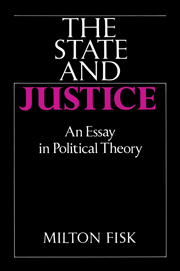Book contents
- Frontmatter
- Contents
- Preface
- Introduction: Can the state rule without justice?
- Part One An outline of a materialist political theory
- Part Two An assessment of the place of justice in the state
- 5 Ideal justice
- 6 Property and justice
- 7 Repression and radical justice
- 8 Justice and materialism
- 9 Equality and liberty
- 10 Class and the limits of control
- Part Three A functional view of political institutions
- Part Four An account of the community of states
- Part Five A reflection on the transition to a new kind of state
- Conclusion: State, class, and democracy
- Notes
- Index
10 - Class and the limits of control
Published online by Cambridge University Press: 06 July 2010
- Frontmatter
- Contents
- Preface
- Introduction: Can the state rule without justice?
- Part One An outline of a materialist political theory
- Part Two An assessment of the place of justice in the state
- 5 Ideal justice
- 6 Property and justice
- 7 Repression and radical justice
- 8 Justice and materialism
- 9 Equality and liberty
- 10 Class and the limits of control
- Part Three A functional view of political institutions
- Part Four An account of the community of states
- Part Five A reflection on the transition to a new kind of state
- Conclusion: State, class, and democracy
- Notes
- Index
Summary
Class itself is an issue of justice. It suggests inequality in several dimensions, and putting limits on this inequality impacts on the class structure. Control is the most important of these dimensions of inequality. Upper classes have the balance of control over lower classes. This is not to deny that economic relations are at the root of class. Still, a complete understanding of class involves three levels of consideration: the level of economic relations, that of control relations, and finally that of the modification of control by state justice. The theory of class that then emerges is integrated into the theory of the state.
The economic and the political
There is an old debate about the relation of the state to the economy. The debate turns on what we are going to mean by distinctness. Is the economy distinct from the state? The economy in the period just preceding monopoly capitalism is often seen as having operated autonomously from political influences. There was a free play of market forces without political constraints. In contrast, it is held that there was no economy distinct from the political sphere in the feudal period and that the same has become true once again in the recent period of what is sometimes called state monopoly capitalism. Of course, if not being distinct means inextricably held together, then it is true enough that in the contemporary as well as the feudal period there is no distinct economy.
- Type
- Chapter
- Information
- The State and JusticeAn Essay in Political Theory, pp. 127 - 138Publisher: Cambridge University PressPrint publication year: 1989

